The AMD 2nd Gen Ryzen Deep Dive: The 2700X, 2700, 2600X, and 2600 Tested
by Ian Cutress on April 19, 2018 9:00 AM ESTCPU Legacy Tests
Our legacy tests represent benchmarks that were once at the height of their time. Some of these are industry standard synthetics, and we have data going back over 10 years. All of the data here has been rerun on Windows 10, and we plan to go back several generations of components to see how performance has evolved.
All of our benchmark results can also be found in our benchmark engine, Bench.
3D Particle Movement v1
3DPM is a self-penned benchmark, taking basic 3D movement algorithms used in Brownian Motion simulations and testing them for speed. High floating point performance, MHz and IPC wins in the single thread version, whereas the multithread version has to handle the threads and loves more cores. This is the original version, written in the style of a typical non-computer science student coding up an algorithm for their theoretical problem, and comes without any non-obvious optimizations not already performed by the compiler, such as false sharing.
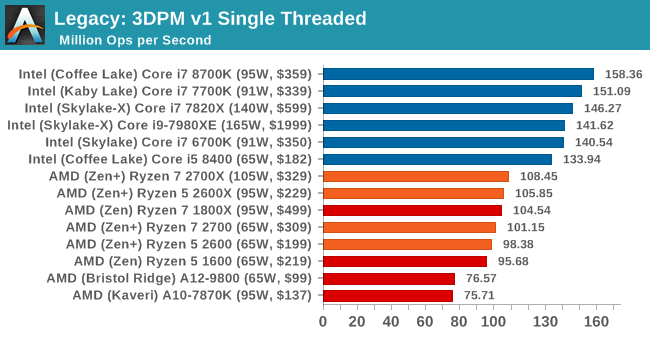
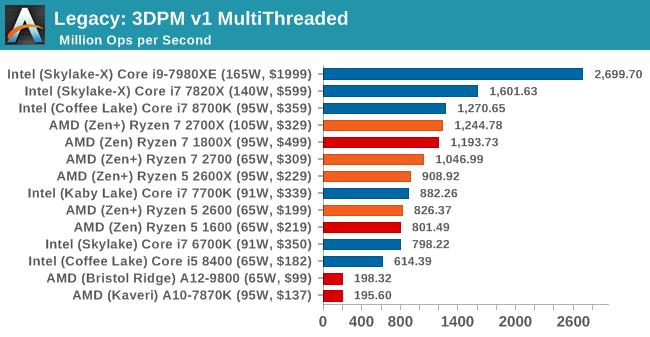
CineBench 11.5 and 10
Cinebench is a widely known benchmarking tool for measuring performance relative to MAXON's animation software Cinema 4D. Cinebench has been optimized over a decade and focuses on purely CPU horsepower, meaning if there is a discrepancy in pure throughput characteristics, Cinebench is likely to show that discrepancy. Arguably other software doesn't make use of all the tools available, so the real world relevance might purely be academic, but given our large database of data for Cinebench it seems difficult to ignore a small five minute test. We run the modern version 15 in this test, as well as the older 11.5 and 10 due to our back data.
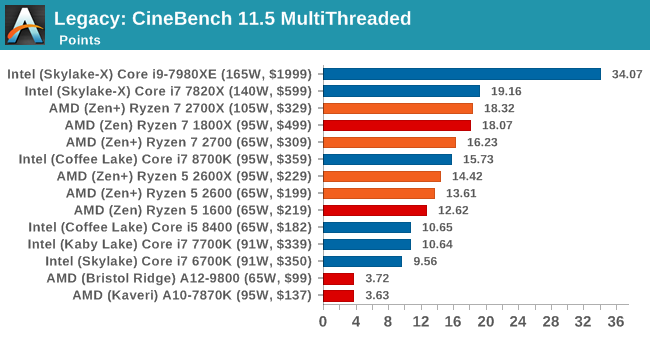
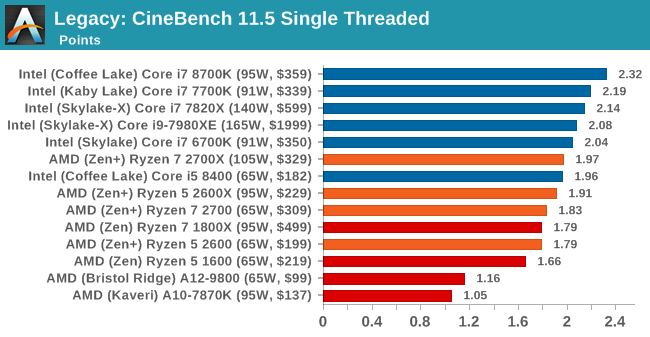

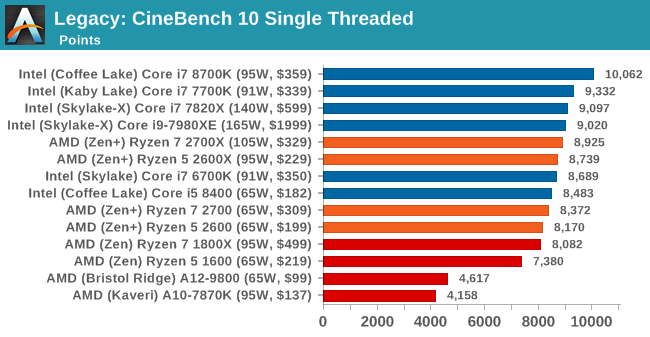
x264 HD 3.0
Similarly, the x264 HD 3.0 package we use here is also kept for historic regressional data. The latest version is 5.0.1, and encodes a 1080p video clip into a high quality x264 file. Version 3.0 only performs the same test on a 720p file, and in most circumstances the software performance hits its limit on high end processors, but still works well for mainstream and low-end. Also, this version only takes a few minutes, whereas the latest can take over 90 minutes to run.
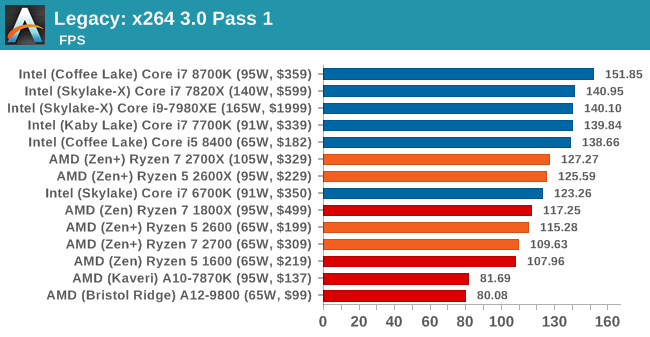
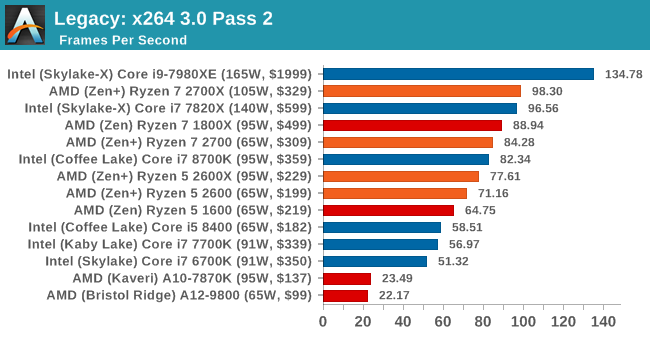










545 Comments
View All Comments
rocky12345 - Tuesday, April 24, 2018 - link
They ran all systems at both Intel's & AMD's listed specs as such AMD's memory was at 2933MHz on Zen+ & 2666MHz on Intel's Coffee lake 8700K,they did the same for the older gen parts as well and ran those at the spec's listed for them as well.There have been a few other media outlets that did the same thing and got the same results or very close to the same results. AMD's memory bandwidth as in memory controller seems to give more bandwidth than Intel's does at the same speed so with Intel not running at 3200MHz like most media outlets did maybe Intel loses a lot of performance because of that and AMD lost next to nothing from not going 3200MHz. It is all just guesses on my part at the moment.
Food for thought when Intel released the entire Coffee Lake line up they only released the z370 chip set which has full support for over clocking including the memory and almost all reviews were done with 3200MHz-3400MHz memory on the test beds even for the non K Coffee lakes CPU's. Maybe Intel knew this would happen and made sure all Coffee lakes looked their best in the reviews. For a few sites that retested once the lower tier chip sets were released the non K's using their rated memory speeds lost about 5%-7% performance in some cases a bit even more.
I am no fanboy of any company I just put out my opinions & theories that are based off of the information we are given by the companies and as well as the media sites.
Maxiking - Tuesday, April 24, 2018 - link
People never fail to amaze me, so you basically know nothing about the topic, yet you still managed to spit 4 paragraphs of mess, even made some "food for thought".Slower ram - performance regression unless you have big caches which is not the case of Intel nor AMD.
rocky12345 - Tuesday, April 24, 2018 - link
It seems pretty basic to me as to what was said in the post. It is not my problem if you do not under stand what myself and some others have said about this topic. Pretty simple slower memory less bandwidth which in turn will give less performance in memory intensive work loads such as most games. ALl you have to do is go and look at some benches in the reviews to see AMD has the upper hand when it comes to memory bandwidth even Hardware Unboxed was pretty surprised by how good AMD's memory controller when compared to Intel's. Yes Intel's can run memory at higher speeds than AMD but even with that said AMD does just fine. You are right about cache sizes neither has a overly large cache but AMD 's is bigger on the desktop class CPU's and that is most likely one of the reasons their bandwidth for memory is slightly better.Maxiking - Wednesday, April 25, 2018 - link
The raw bandwidth doesn't matter, it's cas latency what makes the difference here.https://www.anandtech.com/show/11857/memory-scalin...
https://imgur.com/MhqKfkf
With CL16, it doesn't look that much impressive, is it.
Now, lower the CL latencies to something more 2k18-ish, booom.
https://www.eteknix.com/memory-speed-large-impact-...
Another test
https://www.pcper.com/reviews/Processors/Ryzen-Mem...
Almost all the popular hw reviewers don't have a clue. They tell you to OC but do not explain why and what you should accomplish by overclocking. Imagine you have some bad hynix ram which can be barelly OC from 2666 to 3000mhz but you have to loose timing from CL15 for CL20 to get there.
mapesdhs - Monday, May 14, 2018 - link
schlock, the chips were run at official spec. Or are you saying it's AMD's fault that Intel doesn't officially support faster speeds? :D Also, GN showed that subtimings have become rather important for AMD CPUs; some mbds left on Auto for subtimings will make very good selections for them, giving a measurable performance advantage.peevee - Tuesday, April 24, 2018 - link
It is April 24th, and the page on X470 still states: "Technically the details of the chipset are also covered by the April 19th embargo, so we cannot mention exactly what makes them different to the X370 platform until then."jor5 - Tuesday, April 24, 2018 - link
The review is a shambles. They've gone to ground.coburn_c - Tuesday, April 24, 2018 - link
I have been wanting to read their take on x470..risa2000 - Wednesday, April 25, 2018 - link
It is my favorite page too.mpbello - Tuesday, April 24, 2018 - link
Today phoronix is reporting that after AMD's newest AGESA update their 2700X system is showing 10+% improvement on a number of benchmarks. It is unknown if on Windows the impact will be the same. But you see how all the many variables could explain the differences.